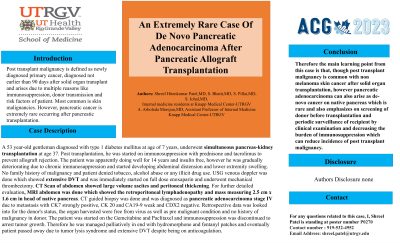Sunday Poster Session
Category: Biliary/Pancreas
P0107 - An Extremely Rare Case of de novo Pancreatic Adenocarcinoma After Pancreatic Allograft Transplantation
Sunday, October 22, 2023
3:30 PM - 7:00 PM PT
Location: Exhibit Hall

Has Audio
.jpg)
Shreel H. Patel, MD
UTRGV-Knapp Medical Center
Weslaco, TX
Presenting Author(s)
Shreel H. Patel, MD, Sahir Bhatti, MD, Sreejith Pillai, MD, Suneet Johal, MD, Andres Arboleda Morejon, MD
UTRGV-Knapp Medical Center, Weslaco, TX
Introduction: Post transplant malignancy is defined as newly diagnosed primary cancer, diagnosed not earlier than 90 days after solid organ transplant and arises due to multiple reasons like immunosuppression, donor transmission and risk factors of patient. Most common is skin malignancies. However, pancreatic cancer is extremely rare occurring after pancreatic transplantation.
Case Description/Methods: A 53 year-old gentleman diagnosed with type 1 diabetes mellitus at age of 7 years, underwent simultaneous pancreas-kidney transplantation at age 37. Post transplantation, he was started on immunosuppression with prednisone and tacrolimus to prevent allograft rejection. The patient was apparently doing well for 14 years and insulin free, however he was gradually deteriorating due to chronic immunosuppression and started developing abdominal distension and lower extremity swelling. No family history of malignancy and patient denied tobacco, alcohol abuse or any illicit drug use. USG venous doppler was done which showed extensive DVT and was immediately started on full dose enoxaparin and underwent mechanical thrombectomy. CT Scan of abdomen showed large volume ascites and peritoneal thickening. For further detailed evaluation, MRI abdomen was done which showed the retroperitoneal lymphadenopathy and mass measuring 2.5 cm x 1.6 cm in head of native pancreas. CT guided biopsy was done and was diagnosed as pancreatic adenocarcinoma stage IV due to metastasis with CK7 strongly positive, CK 20 and CA19-9 weak and CDX2 negative. Retrospective data was looked into for the donor's status, the organ harvested were free from virus as well as pre malignant condition and no history of malignancy in donor. The patient was started on the Gemcitabine and Paclitaxel and immunosuppression was discontinued to arrest tumor growth. Therefore he was managed palliatively in end with hydromorphone and fentanyl patches and eventually patient passed away due to tumor lysis syndrome and extensive DVT despite being on anticoagulation.
Discussion: Therefore the main learning point from this case is that, though post transplant malignancy is common with non melanoma skin cancer after solid organ transplantation, however pancreatic adenocarcinoma can also arise as de-novo cancer on native pancreas which is rare and also emphasizes on screening of donor before transplantation and periodic surveillance of recipient by clinical examination and decreasing the burden of immunosuppression which can reduce incidence of post transplant malignancy.
Disclosures:
Shreel H. Patel, MD, Sahir Bhatti, MD, Sreejith Pillai, MD, Suneet Johal, MD, Andres Arboleda Morejon, MD. P0107 - An Extremely Rare Case of de novo Pancreatic Adenocarcinoma After Pancreatic Allograft Transplantation, ACG 2023 Annual Scientific Meeting Abstracts. Vancouver, BC, Canada: American College of Gastroenterology.
UTRGV-Knapp Medical Center, Weslaco, TX
Introduction: Post transplant malignancy is defined as newly diagnosed primary cancer, diagnosed not earlier than 90 days after solid organ transplant and arises due to multiple reasons like immunosuppression, donor transmission and risk factors of patient. Most common is skin malignancies. However, pancreatic cancer is extremely rare occurring after pancreatic transplantation.
Case Description/Methods: A 53 year-old gentleman diagnosed with type 1 diabetes mellitus at age of 7 years, underwent simultaneous pancreas-kidney transplantation at age 37. Post transplantation, he was started on immunosuppression with prednisone and tacrolimus to prevent allograft rejection. The patient was apparently doing well for 14 years and insulin free, however he was gradually deteriorating due to chronic immunosuppression and started developing abdominal distension and lower extremity swelling. No family history of malignancy and patient denied tobacco, alcohol abuse or any illicit drug use. USG venous doppler was done which showed extensive DVT and was immediately started on full dose enoxaparin and underwent mechanical thrombectomy. CT Scan of abdomen showed large volume ascites and peritoneal thickening. For further detailed evaluation, MRI abdomen was done which showed the retroperitoneal lymphadenopathy and mass measuring 2.5 cm x 1.6 cm in head of native pancreas. CT guided biopsy was done and was diagnosed as pancreatic adenocarcinoma stage IV due to metastasis with CK7 strongly positive, CK 20 and CA19-9 weak and CDX2 negative. Retrospective data was looked into for the donor's status, the organ harvested were free from virus as well as pre malignant condition and no history of malignancy in donor. The patient was started on the Gemcitabine and Paclitaxel and immunosuppression was discontinued to arrest tumor growth. Therefore he was managed palliatively in end with hydromorphone and fentanyl patches and eventually patient passed away due to tumor lysis syndrome and extensive DVT despite being on anticoagulation.
Discussion: Therefore the main learning point from this case is that, though post transplant malignancy is common with non melanoma skin cancer after solid organ transplantation, however pancreatic adenocarcinoma can also arise as de-novo cancer on native pancreas which is rare and also emphasizes on screening of donor before transplantation and periodic surveillance of recipient by clinical examination and decreasing the burden of immunosuppression which can reduce incidence of post transplant malignancy.
Disclosures:
Shreel Patel indicated no relevant financial relationships.
Sahir Bhatti indicated no relevant financial relationships.
Sreejith Pillai indicated no relevant financial relationships.
Suneet Johal indicated no relevant financial relationships.
Andres Arboleda Morejon indicated no relevant financial relationships.
Shreel H. Patel, MD, Sahir Bhatti, MD, Sreejith Pillai, MD, Suneet Johal, MD, Andres Arboleda Morejon, MD. P0107 - An Extremely Rare Case of de novo Pancreatic Adenocarcinoma After Pancreatic Allograft Transplantation, ACG 2023 Annual Scientific Meeting Abstracts. Vancouver, BC, Canada: American College of Gastroenterology.
